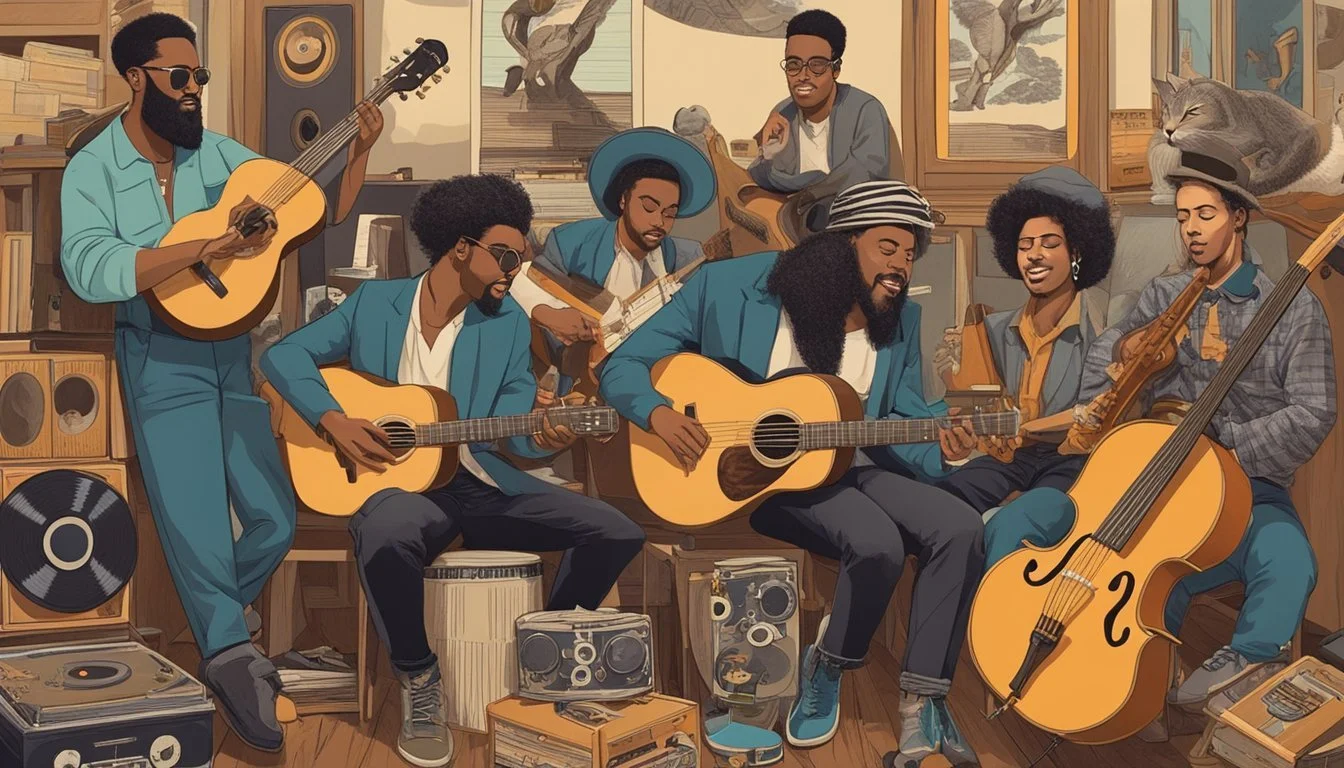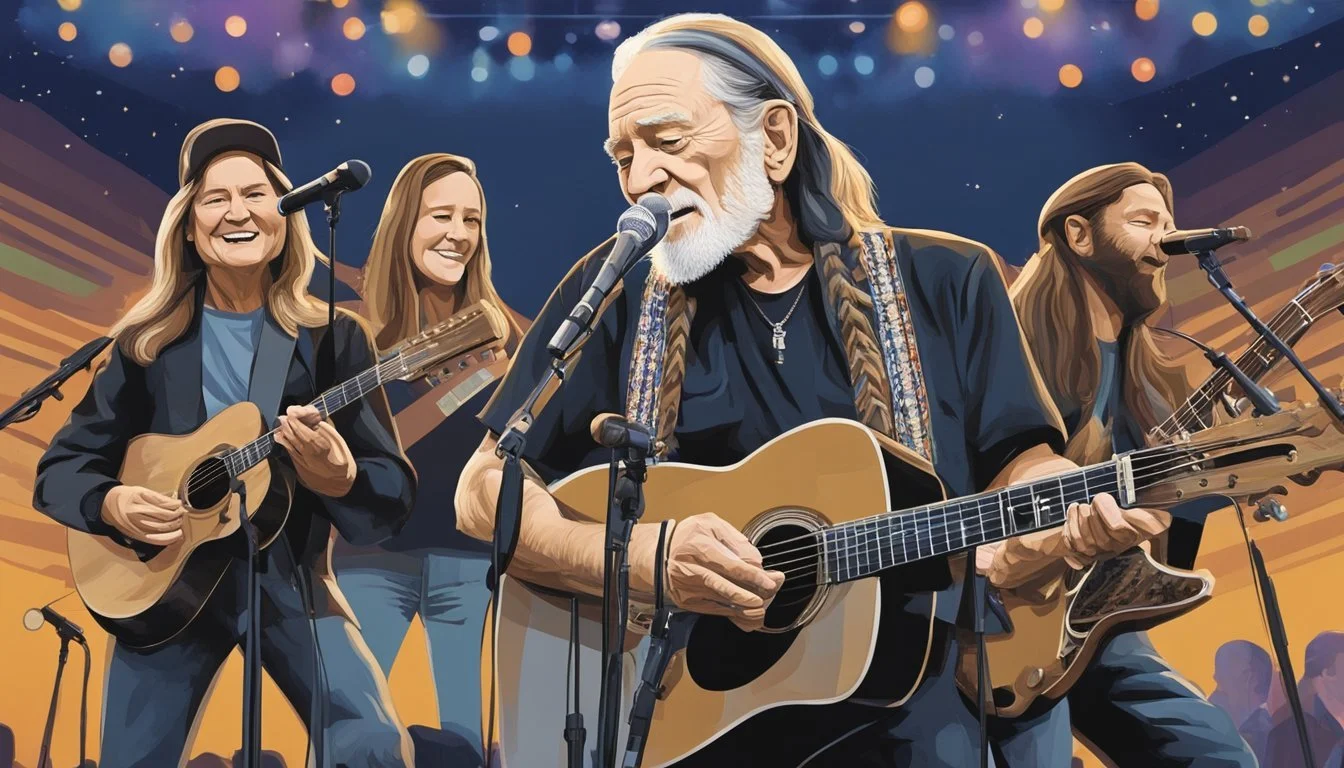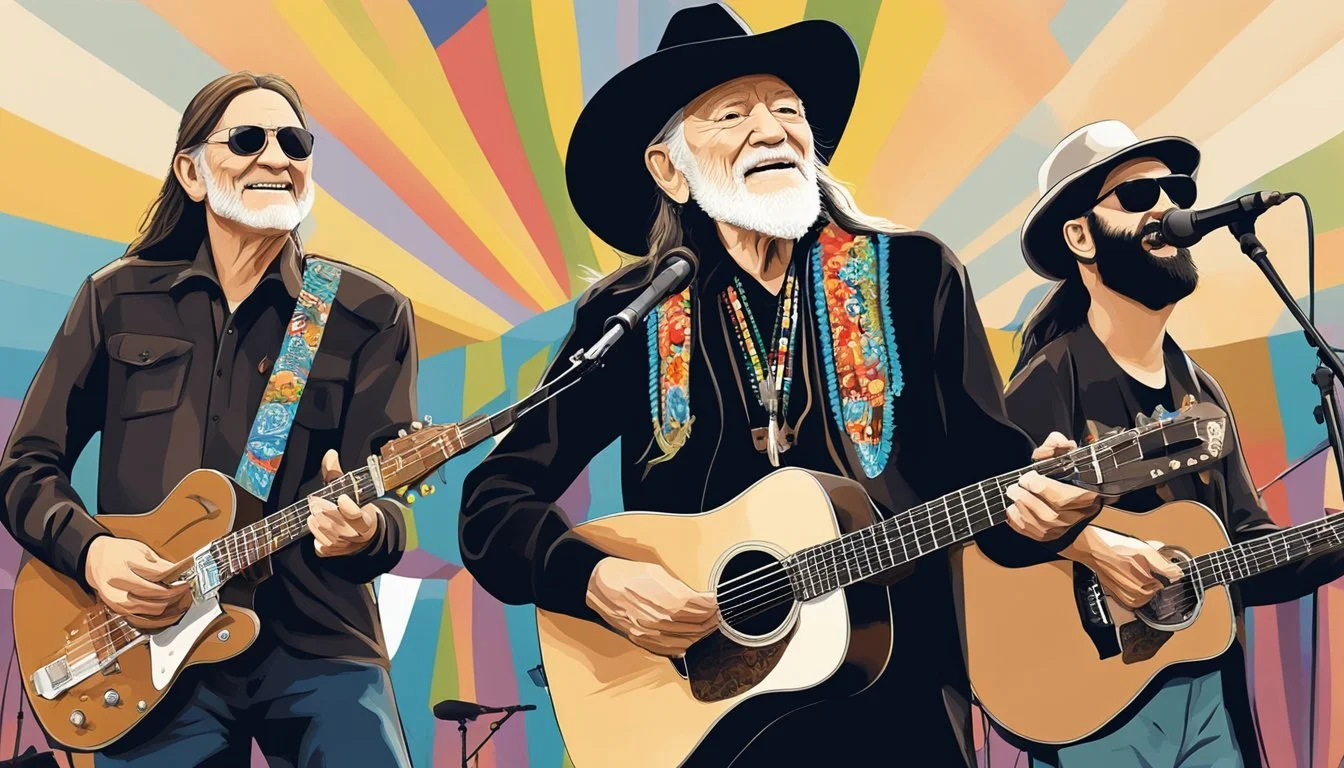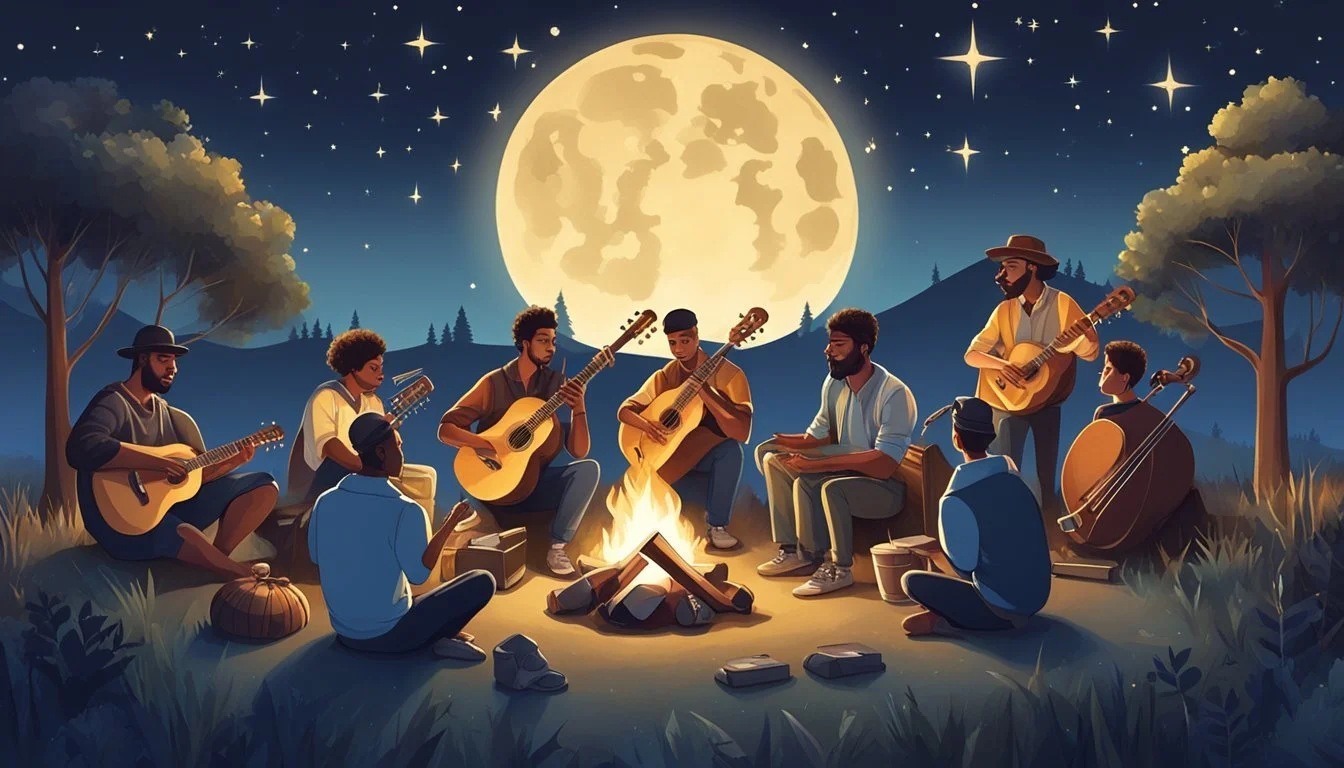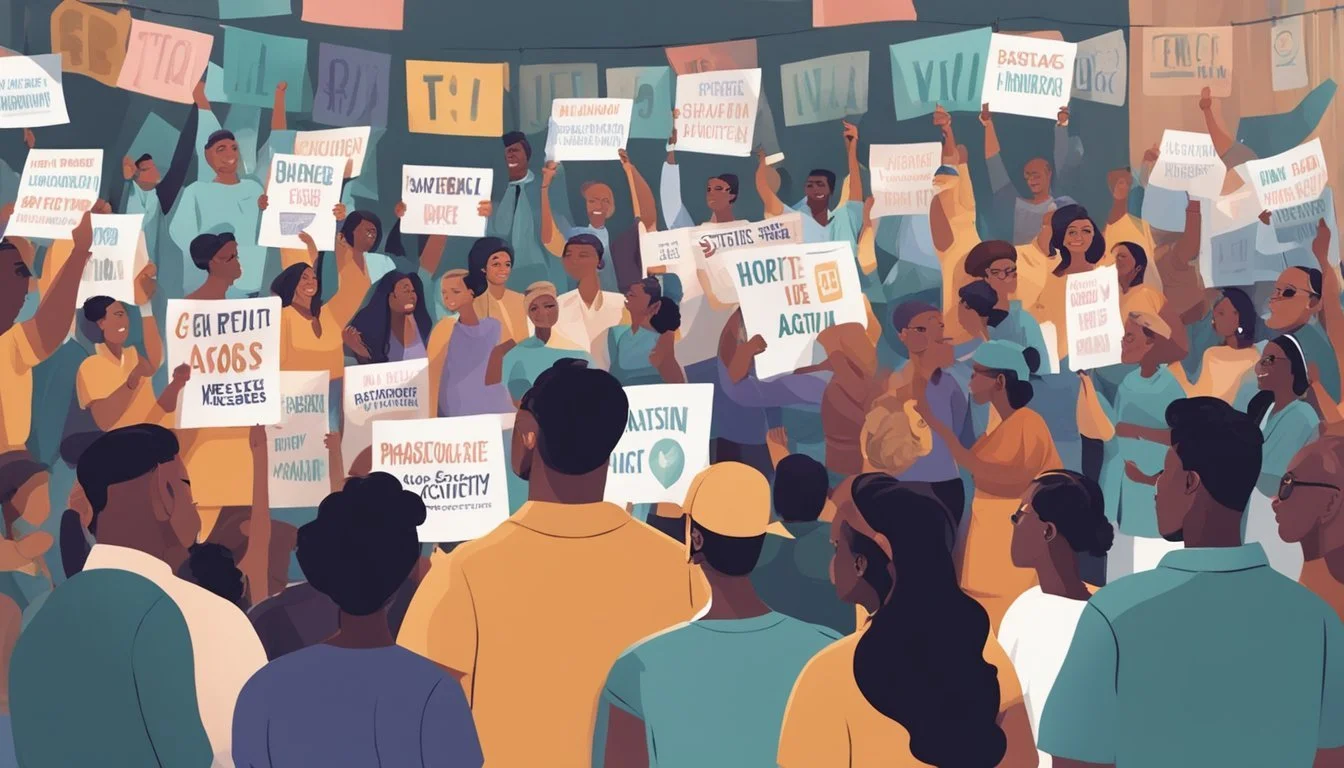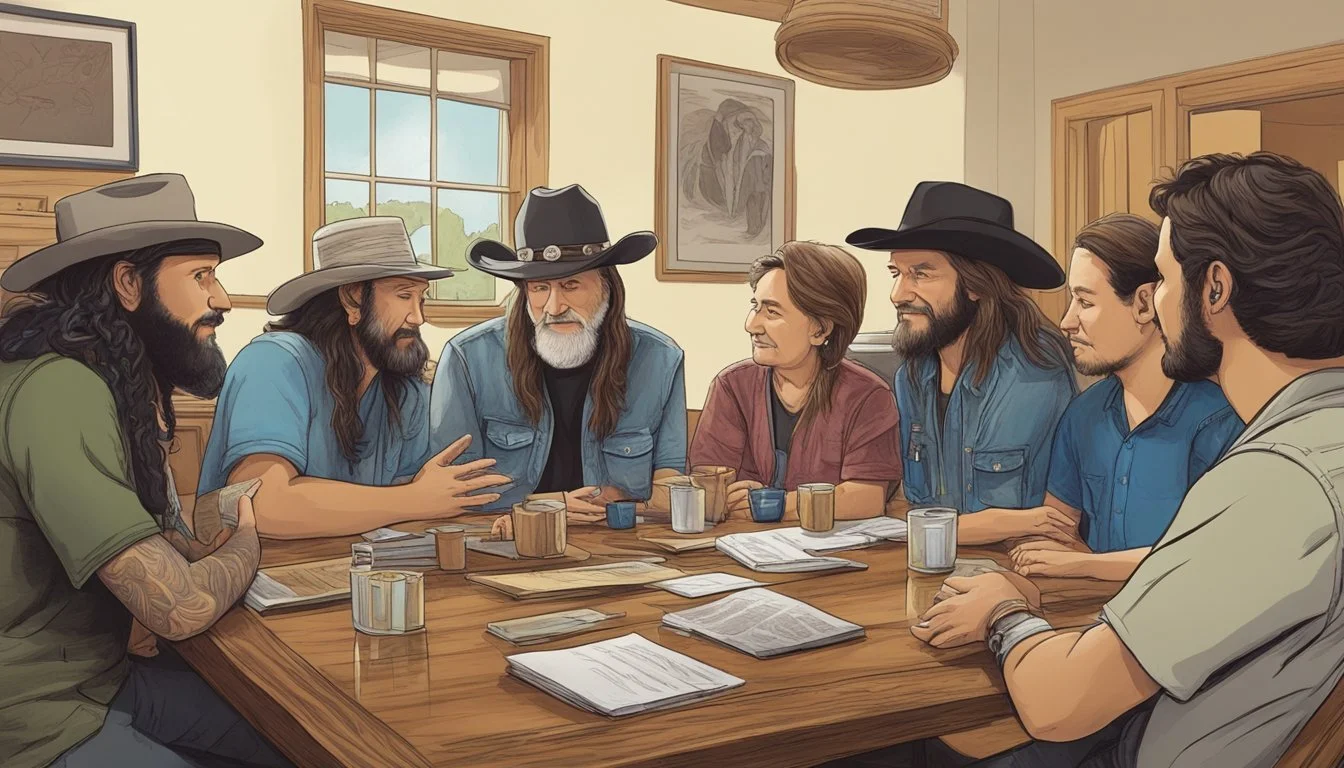Willie Unveiled: Legends Spill Secrets in Paramount+'s Nelson Family Tell-All
Willie Nelson & Family, a four-part documentary series released in December 2023, offers an intimate look at the life and career of one of country music's most iconic figures. The series, available on Paramount+, provides unprecedented access to Willie Nelson's personal and professional journey, featuring rare footage and interviews with fellow music legends.
Directed by Oren Moverman and Thom Zimny, the documentary explores Nelson's ups and downs, both on and off stage. It delves into his spiritual side, dramatic moments, and playful nature, painting a comprehensive portrait of the beloved musician.
The series includes interviews with notable artists such as Dolly Parton, Kenny Chesney, and Sheryl Crow, adding depth and context to Nelson's story. Its premiere at the 2023 Sundance Film Festival generated significant buzz among critics and fans alike, solidifying its place as a must-watch for country music enthusiasts and casual viewers.
Early Life and Upbringing
Willie Hugh Nelson entered the world on April 29, 1933, in the small town of Abbott, Texas. His parents, Ira and Myrle Nelson, separated shortly after his birth, leaving Willie and his older sister Bobbie in the care of their grandparents.
Growing up in Abbott during the Great Depression shaped Willie's early years. He and Bobbie were raised by their paternal grandparents, William and Nancy Nelson, who introduced them to music at a young age.
The Nelson household was filled with gospel hymns and country tunes. Willie received his first guitar at age six and began writing songs soon after. His grandfather taught him basic chords, while his grandmother encouraged his musical pursuits.
Abbott's rural setting played a significant role in Willie's upbringing. He worked in the cotton fields as a child, an experience that would later influence his songwriting and advocacy for farmers.
Willie's early musical influences included:
Bob Wills
Hank Williams
Django Reinhardt
These artists, along with the gospel music from his childhood, helped shape Willie's unique sound and style that would eventually revolutionize country music.
Musical Journey and Songwriting
Willie Nelson's iconic career spans over six decades, marked by his distinctive songwriting style and contributions to the outlaw country movement. His musical journey transformed him from a Nashville songwriter to a pioneering artist who reshaped the country music landscape.
Development as a Songwriter
Willie Nelson's songwriting talents emerged early in his career. Born in Abbott, Texas in 1933, he began writing songs as a child. His first composition, "Family Bible," was sold for $50 in 1957. This early experience sparked his passion for crafting lyrics.
Nelson's unique writing style blended country, folk, and jazz influences. He often drew inspiration from personal experiences and observations of everyday life. His ability to convey complex emotions through simple, relatable lyrics became a hallmark of his work.
In the 1960s, Nelson moved to Nashville, where he honed his craft as a professional songwriter. He penned hits for other artists, including "Crazy" for Patsy Cline and "Hello Walls" for Faron Young.
Rise to Fame
Nelson's transition from songwriter to performer marked a turning point in his career. In the early 1970s, he moved back to Texas and began performing regularly at Austin's Armadillo World Headquarters. This period saw him grow his signature long hair and beard, adopting the unconventional image that would become his trademark.
His 1973 album "Shotgun Willie" showcased his evolving sound, blending country with rock and folk influences. The album didn't achieve immediate commercial success but earned critical acclaim and laid the foundation for his future work.
Nelson's breakthrough came with the concept album "Red Headed Stranger" in 1975. The stripped-down production and narrative storytelling approach resonated with audiences and critics alike.
Outlaw Country Movement
Willie Nelson became a key figure in the outlaw country movement of the 1970s. This subgenre emerged as a reaction to the polished Nashville sound, emphasizing artistic freedom and a return to country music's roots.
Nelson, along with artists like Waylon Jennings and Kris Kristofferson, rejected the conventional Nashville approach. They favored a raw, unvarnished sound and lyrics that tackled complex themes.
The 1976 compilation album "Wanted! The Outlaws," featuring Nelson, Jennings, Tompall Glaser, and Jessi Colter, became country music's first platinum album. It solidified Nelson's status as an outlaw country icon.
Notable Albums and Hits
Throughout his career, Willie Nelson has released numerous influential albums and hit singles. Some standout works include:
"Red Headed Stranger" (1975): A concept album that became a critical and commercial success.
"Stardust" (1978): A collection of pop standards that showcased Nelson's versatility.
"Always on My Mind" (1982): The title track became one of his signature songs.
Notable hit singles:
"On the Road Again"
"Blue Eyes Crying in the Rain"
"Georgia on My Mind"
Nelson's collaborations with other artists have also produced memorable works, such as "Pancho and Lefty" with Merle Haggard. His prolific output continues to this day, with over 70 solo studio albums released.
Career Milestones and Achievements
Willie Nelson's career spans over six decades, marked by groundbreaking albums, iconic performances, and influential advocacy work. His remarkable journey has cemented his status as a country music legend and cultural icon.
Critical Acclaim and Awards
Willie Nelson has garnered numerous accolades throughout his storied career. He has won 12 Grammy Awards, including a Lifetime Achievement Award in 2000. Nelson was inducted into the Country Music Hall of Fame in 1993, recognizing his immense contributions to the genre.
His album "Red Headed Stranger" (1975) is considered a masterpiece, earning critical praise and commercial success. It revolutionized the outlaw country movement and showcased Nelson's storytelling prowess.
In 2015, Nelson received the prestigious Gershwin Prize for Popular Song from the Library of Congress, acknowledging his impact on American music.
Influential Collaborations
Nelson's collaborative spirit has led to memorable musical partnerships. His work with Waylon Jennings, particularly on the album "Wanted! The Outlaws" (1976), helped define the outlaw country sound.
He formed The Highwaymen supergroup with Johnny Cash, Kris Kristofferson, and Waylon Jennings in 1985. Their albums and tours became country music milestones.
Nelson's duets with artists across genres, including Julio Iglesias ("To All the Girls I've Loved Before") and Norah Jones ("Wurlitzer Prize"), demonstrate his versatility and wide-ranging appeal.
Fellow Artists
Willie Nelson has earned the respect and admiration of his peers in the music industry. Dolly Parton and Shelby Lynne, among others, have praised his authenticity and musical genius in interviews featured in the "Willie Nelson & Family" documentary.
Producer Don Was commends Nelson's genuine approach to music and life. This reverence from fellow artists underscores Nelson's influence on multiple generations of musicians.
His annual Farm Aid benefit concert, co-founded in 1985, brings together prominent artists to support family farmers, showcasing Nelson's leadership in both music and activism.
Musical Legacy
Willie Nelson's impact on country music is immeasurable. His distinctive vocal style, innovative guitar playing, and genre-blending approach have influenced countless artists.
Nelson's songwriting prowess is evident in classics like "Crazy," "On the Road Again," and "Always on My Mind." These songs have become part of the American musical canon.
His willingness to experiment with different genres, from jazz to reggae, has expanded the boundaries of country music. Nelson's longevity and continued relevance in the industry serve as an inspiration to emerging artists.
As a National Treasure, Willie Nelson's contributions to music and culture continue to resonate, solidifying his place in Country Music History.
Film and Documentary Features
Willie Nelson's life and career have been captured in various films and documentaries over the years. These productions offer unique insights into the country music legend's journey and impact on the industry.
Biographical Films
Several biographical films have portrayed Willie Nelson's life and music. The 1980 movie "Honeysuckle Rose" starred Nelson as a fictional country singer, drawing inspiration from his own experiences. In 2008, "Surfer, Dude" featured Nelson in a supporting role, showcasing his acting abilities alongside his musical talents. These films helped introduce Nelson to wider audiences and solidified his status as a cultural icon beyond the country music scene.
Paramount+ Documentary
"Willie Nelson & Family" is a groundbreaking 2023 documentary series released on Paramount+. Directed by filmmakers Oren Moverman and Thom Zimny, this four-part series offers an authorized and comprehensive look at Nelson's life and career. The documentary features exclusive interviews with Nelson, his family members, and fellow artists like Dolly Parton and Kenny Chesney. It premiered on December 21, 2023, after a preview screening at the Sundance Film Festival earlier that year.
Archival Footage
The "Willie Nelson & Family" documentary series incorporates rare archival footage, providing viewers with a unique glimpse into Nelson's past. This footage includes early performances, behind-the-scenes moments, and personal family videos. The inclusion of these historical materials helps paint a vivid picture of Nelson's journey from his humble beginnings to becoming a music legend. The archival content adds depth and authenticity to the documentary, allowing fans to witness key moments in Nelson's life and career firsthand.
Personal Life and Relationships
Willie Nelson's personal life has been marked by multiple marriages, a large blended family, and complex relationships. His journey through love, loss, and family bonds has shaped both his music and his public persona.
Family Members
Willie Nelson has seven children from his various marriages. His oldest daughter Lana was born in 1953, followed by Susie and Willie "Billy" Hugh Jr. in the 1950s. Daughters Paula and Amy were born in the 1960s. Lukas and Micah, his sons with current wife Annie D'Angelo, were born in the 1980s.
Tragically, Willie's son Billy passed away on Christmas Day 1991. This loss deeply affected the singer and his family.
Nelson's sister Bobbie, who passed away in 2022, was a longtime member of his band and a close confidante throughout his life.
Marriages and Divorce
Willie Nelson has been married four times. His first marriage to Martha Matthews lasted from 1952 to 1962. He then married Shirley Collie in 1963, but they divorced in 1971.
His third marriage to Connie Koepke lasted from 1971 to 1988. During this time, Nelson's career soared, but his personal life faced challenges.
In 1991, Nelson married Annie D'Angelo, his current wife. Their relationship has been a stabilizing force in his later years.
The Family
The "Willie Nelson & Family" moniker extends beyond blood relations to include his band members and close friends. This chosen family has been crucial to Nelson's music and personal life.
His sons Lukas and Micah have followed in their father's musical footsteps, often performing with him. This collaboration has strengthened their family bond.
Nelson's large, blended family presents unique challenges, especially given his public status. The documentary "Willie Nelson & Family" offers insights into how he balances fame with family life.
Legacy and Influence
Willie Nelson's impact on music and culture extends far beyond his hit songs. His unique style and authenticity have shaped country music and influenced generations of artists.
Impact on Music History
Willie Nelson revolutionized country music with his distinctive voice and unconventional songwriting. He helped pioneer the Outlaw Country movement in the 1970s, challenging Nashville's polished sound with a raw, authentic approach.
Nelson's 1975 album "Red Headed Stranger" became a landmark release, showcasing his storytelling prowess. His rendition of "Blue Eyes Crying in the Rain" topped the country charts, introducing his sound to a wider audience.
His crossover appeal brought country music to new listeners, bridging gaps between genres. Nelson's collaborations with diverse artists further expanded country music's reach and acceptance.
Contribution to Genre
Nelson's songwriting skills redefined country music's boundaries. He blended elements of jazz, folk, and pop into his country sound, creating a unique musical identity.
His honest, introspective lyrics tackled complex themes, elevating country songwriting. Nelson's guitar playing style, featuring his trusty acoustic "Trigger," became instantly recognizable.
As a performer, he emphasized authenticity over polish, inspiring a more relaxed approach to country music. Nelson's Farm Aid concerts, starting in 1985, brought attention to struggling American farmers, showcasing music's power for social change.
Admiration by Fellow Artists
Willie Nelson's influence spans generations of musicians across genres. Younger country artists often cite him as a major inspiration for his songwriting and individuality.
His collaborative spirit led to memorable duets and projects with artists like Merle Haggard, Johnny Cash, and Waylon Jennings. These partnerships cemented his status as a respected peer among country legends.
Pop and rock musicians also admire Nelson's artistry. His ability to transcend genre boundaries has earned him respect in diverse musical circles. Many artists seek out Nelson for duets, viewing such collaborations as career highlights.
Philanthropy and Activism
Willie Nelson's impact extends far beyond his music. The documentary "Willie Nelson & Family" highlights his dedication to various charitable causes and social movements.
Nelson has been a staunch advocate for American farmers. He co-founded Farm Aid in 1985, an annual benefit concert that has raised millions of dollars to support family farms.
His philanthropy also includes support for:
Environmental conservation
Animal welfare
Disaster relief efforts
Veterans' organizations
Nelson's activism is prominently featured in the series. He has been a vocal proponent of marijuana legalization, using his platform to advocate for reform.
The documentary showcases Nelson's involvement in political campaigns and his efforts to raise awareness about climate change. It provides insight into how he has leveraged his fame to draw attention to important social issues.
Through rare footage and interviews, viewers gain a deeper understanding of Nelson's philanthropic endeavors. The series illustrates how his music and activism often intersect, with many of his songs addressing social and political themes.
Nelson's commitment to giving back has inspired many in the music industry. The documentary portrays him as a role model for artists who wish to use their influence for positive change.
Discography and Tours
Willie Nelson's prolific musical career spans over six decades, encompassing extensive touring and a vast discography that includes groundbreaking concept albums.
Touring Life
Willie Nelson's commitment to live performances is legendary. He typically plays over 100 shows per year, even into his late 80s. His touring band, known as the Family, has been a constant presence since the 1970s. Key members include his sister Bobbie on piano and longtime harmonica player Mickey Raphael.
Nelson's tour bus, the Honeysuckle Rose, is iconic in country music lore. He has gone through several iterations of this bus over the years, each customized to his needs.
His live shows blend classic hits with newer material and cover songs, creating a unique experience for fans at every performance.
Musical Career
Willie Nelson's discography is extensive, with over 70 solo studio albums and numerous collaborative projects. His breakthrough came with the 1973 album "Shotgun Willie," which marked his transition to the outlaw country sound.
Notable albums include:
"Red Headed Stranger" (1975)
"Stardust" (1978)
"Always on My Mind" (1982)
Nelson's musical style blends country, jazz, and folk influences. He's known for his distinctive vocal phrasing and guitar playing on his trusty acoustic guitar, Trigger.
Throughout his career, Nelson has collaborated with artists across genres, from Waylon Jennings to Snoop Dogg.
Concept Albums
Willie Nelson has released several influential concept albums that tell cohesive stories or explore specific themes:
"Red Headed Stranger" (1975): A western outlaw narrative that revolutionized country music.
"Phases and Stages" (1974): Explores a divorce from both the man's and woman's perspectives.
"The IRS Tapes: Who'll Buy My Memories?" (1992): Released to pay off tax debts, featuring stripped-down versions of his songs.
These concept albums showcase Nelson's storytelling abilities and willingness to experiment with the album format. They've become essential parts of his discography and country music history.
Partnerships and Collaborations
Willie Nelson's musical journey is marked by numerous collaborations that have enriched country music and beyond. His partnerships span genres and generations, creating memorable duets and expanding his artistic reach.
Work with Other Artists
Willie Nelson has joined forces with diverse talents throughout his career. His duet with Dolly Parton on "Pretty Paper" stands out as a cherished holiday classic. Nelson's collaboration with Sheryl Crow brought together country and rock sensibilities.
Kenny Chesney and Willie Nelson's partnership bridged different eras of country music. The legendary singer also ventured into jazz, working with Wynton Marsalis on a critically acclaimed album.
Norah Jones lent her sultry vocals to several Nelson projects, creating a unique blend of country and jazz. Brenda Lee and Willie Nelson's duets showcased the timeless appeal of traditional country music.
Musical Partnerships
Willie Nelson's musical partnerships have often transcended individual songs, leading to full album collaborations. His work with Waylon Jennings defined the outlaw country movement and produced several hit records.
Nelson's collaborations with younger artists like Rosanne Cash have helped maintain his relevance across decades. These partnerships often result in fresh interpretations of classic songs and the creation of new material.
The "Willie Nelson & Family" documentary highlights many of these collaborations, showcasing their impact on Nelson's career and the broader music landscape. These partnerships demonstrate Nelson's versatility and his ability to connect with artists across musical boundaries.
In Popular Media
Willie Nelson's iconic status has made him a prominent figure in various forms of media. His distinctive look and persona have cemented his place in American popular culture beyond just music.
Film and Television Appearances
Willie Nelson has appeared in numerous films and TV shows over the decades. He played a supporting role in the 1979 film "The Electric Horseman" alongside Robert Redford and Jane Fonda. Nelson starred in the 1986 western "Red Headed Stranger," based on his album of the same name.
On television, Nelson has made guest appearances on shows like "Miami Vice" and "Dr. Quinn, Medicine Woman." He played himself in a memorable episode of "The Simpsons" in 1999. More recently, Nelson had a cameo in the hit series "Yellowstone," created by Taylor Sheridan.
Literature and Biographies
Several books have been written about Willie Nelson's life and career. His 2015 autobiography "It's a Long Story: My Life" became a New York Times bestseller. The 2008 biography "Willie Nelson: An Epic Life" by Joe Nick Patoski offers an in-depth look at Nelson's journey.
Nelson has also authored or co-authored multiple books himself. These include "The Facts of Life: And Other Dirty Jokes" (2002) and "Roll Me Up and Smoke Me When I Die: Musings from the Road" (2012). His books often blend autobiographical stories with his unique philosophy on life.
Challenges and Overcoming Obstacles
Willie Nelson faced significant hurdles throughout his career. Financial troubles plagued him, culminating in a massive $32 million debt to the IRS in the 1990s.
To settle this debt, Nelson released the album "The IRS Tapes: Who'll Buy My Memories?" He also sold many personal assets.
Substance abuse presented another major challenge. Nelson struggled with alcohol and marijuana addiction for years, impacting both his personal and professional life.
The music industry itself posed obstacles. In the late 1960s, Nelson found it difficult to fit into the Nashville scene, leading to a temporary career setback.
Despite these setbacks, Nelson's resilience shone through. He overcame his tax troubles, eventually reaching an agreement with the IRS.
Nelson also addressed his substance abuse issues, making positive changes in his lifestyle. His openness about these struggles has inspired many fans.
In the face of industry resistance, Nelson forged his own path. He helped pioneer the "outlaw country" movement, ultimately realizing his dreams of musical success on his own terms.
Nelson's ability to overcome failure and persist in the face of adversity has become a defining aspect of his legacy. His journey from small-town Texas to music icon exemplifies the power of perseverance.

